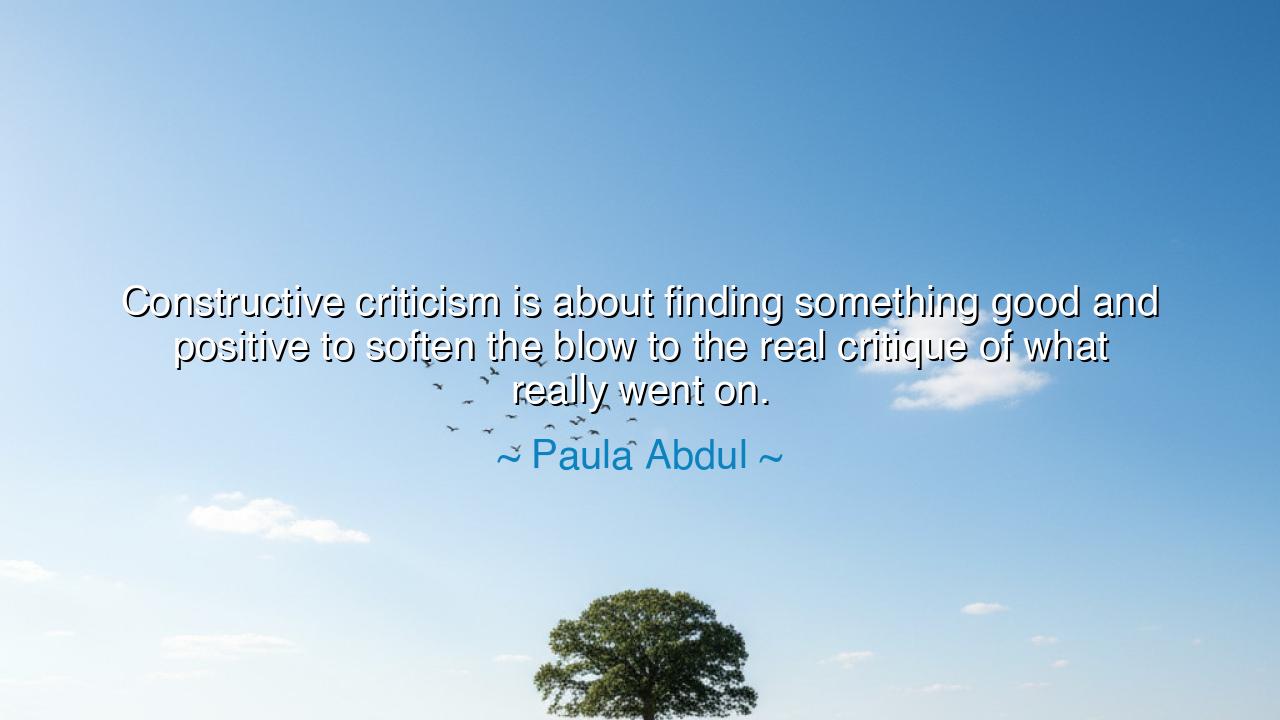
Constructive criticism is about finding something good and
Constructive criticism is about finding something good and positive to soften the blow to the real critique of what really went on.






Hear the words of Paula Abdul, who said: “Constructive criticism is about finding something good and positive to soften the blow to the real critique of what really went on.” This is no idle phrase, but a teaching about the balance between truth and mercy. For though truth is sharp as the sword, mercy is the sheath that allows it to be borne without needless harm. To criticize without compassion is to destroy; to praise without honesty is to deceive. But when truth and kindness are joined, the spirit is uplifted even as it is corrected.
The ancients knew this well. A ruler who heard only flattery grew blind, while a ruler who heard only harshness grew bitter. But the wise kings sought counselors who tempered rebuke with encouragement, who said, “Here is what you have done well, and here is where you must grow.” Such words do not break the hearer but strengthen them, for they are arrows of truth feathered with hope. This is the essence of constructive criticism—not to crush, but to build; not to wound, but to heal.
Consider the story of Michelangelo, whose genius filled the Sistine Chapel with heavenly visions. Yet even he, in his early works, faced critique from those who saw flaws in his craft. A master sculptor, seeing his frustration, did not merely tell him, “This is wrong.” Instead, he praised the fire in Michelangelo’s vision, then gently guided him on how to refine his technique. Thus encouraged, the young artist did not abandon his chisel, but pressed onward to greatness. Had he received only harsh words, his spirit might have faltered; but because he received criticism laced with hope, he transformed into the master the world remembers.
The meaning of Abdul’s words lies also in the recognition of human fragility. The heart, though strong, is tender when exposed to judgment. A word of cruelty may silence creativity for years; a word of kindness may awaken greatness. To “soften the blow” is not weakness—it is wisdom. For the purpose of feedback is not to destroy confidence, but to refine talent. Without the tempering of positivity, truth becomes a hammer; with it, truth becomes a sculptor’s tool.
Let us then take this lesson into our dealings with others. When you must correct, seek first what is noble in their effort. Speak of their strengths before you name their flaws. When you must judge, do so as one who desires growth, not as one who delights in fault. Remember that criticism without compassion breeds resentment, but criticism with encouragement breeds resilience. To follow this path is to become not merely a critic, but a teacher, a guide, and a builder of souls.
And for those who receive criticism, remember this as well: do not despise the correction, even when veiled in kindness. The purpose of constructive words is to make you stronger, more skillful, more wise. Accept the encouragement, but also heed the lesson hidden within. The greatest spirits of history—scientists, artists, leaders—became great because they welcomed correction as fuel, not as insult.
So let Abdul’s wisdom be carved upon your heart: join positivity with truth, and you will change not only the work of others but the course of their lives. When you speak, let your words be both mirror and torch: a mirror to show reality, a torch to guide the way forward. In this union lies the power to build others into their best selves. And if we all learn to wield truth with kindness, then the generations to come shall grow not in fear of judgment, but in the strength of encouragement, rising ever higher toward their full potential.






AAdministratorAdministrator
Welcome, honored guests. Please leave a comment, we will respond soon